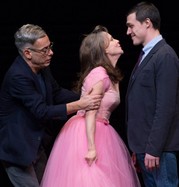
There is greatness on the stage of the Belasco Theater, but it isn’t what has been done to Tennessee Williams’s masterpiece The Glass Menagerie. I’ve come to the conclusion having now seen this new consideration directed by the otherwise adventurous director Sam Gold, that you can’t kill this 72 year-old play written by the greatest playwright that America ever produced. You can turn it inside out, flip it upside down, strip it bare, or deconstruct it (to use contemporary lingo), but the words linger on. They resonate as a delicate, luminescent, and loving work of sculpture just like the miniature glass menagerie that absorbs the fantasizing and soulful mind of the crippled Laura. If ever a Williams play needed honesty truth and an earthy reality to enhance and balance Williams’s unabashedly poetic and lyrical indulgences, The Glass Menagerie is it. Unlike the only other truly great memory play, Eugene O’Neill’s Long Day’s Journey into Night, which is steeped in a masculine consciousness, the fate of Menagerie is sealed by an Amanda who can exist in a timeless feminine consciousness that grittily survives a world and its problems without any loss of romantic illusion. As she has proved in the film “Steel Magnolias,” Academy Award-winner Sally Field is quite capable of being a realistic daughter of the confederacy. That Field was able to remove from my imagining for the time that she was on stage (based also on what I have read about Laurette Taylor’s original performance in 1945) and of other interpreters of the role of Amanda says a lot. She does, without a false note, embodies it with enough of the reality and essence of Williams’ own suggestion — “A little woman of great but confused vitality, clinging frantically to another time and place. She is not paranoiac, but her life is paranoia.” Fields allows the character’s pathetic foolishness to bloom even as she sashays about in her let-out pink cotillion gown and as she slips into the shadows in a staging in which shadows are about as much theatrical enhancement, especially when her daughter’s gentleman caller arrives. Field’s unquestionably captures and combines the almost heroic stoicism of the Southern ex-belle with that inbred antebellum belief in gentility and charm to the bitter end. Although the physically challenged-by-muscular-dystrophy Madison Ferris spends most of her scenes in a wheelchair and has to deal with some problematic, but not insurmountable activities, she performs reasonably well as a decidedly non-ethereal Laura. This is a Laura who is physically sturdy and basically secure in her own illusions, but also somewhat of a contradiction in that Laura should presumably, in a Williams’ reality, be as fragile as her glass sculptures. Williams’s “memory play” needs a narrator that can convey the poet’s twin worlds of fact and dream. Joe Mantello is fine enough, if cast a bit older than we are used to seeing, as the spokesman for melancholy illusion and an adventurer filled with passionate longings. Finn Wittrock is better than good as the very ordinary gentleman caller. His Dale Carnegie-styled confidence shows us just how far self-assurance, a pack of chewing gum, and smile can take you. A quibble among many: I doubt if any young man would show up as a guest for dinner in the 1940s wearing blue jeans, something only farmers wore at that time. The lack of scenic design by Andrew Lieberman probably deserves the lack of lighting credited to Adam Silverman. You may surmise that I am less than impressed with the pretentious minimalism with which Gold decided to burden a drama that needs to float in a sea of clouds and memories and not look like an informal first reading/walkthrough of a play that had never seen the light of day. Presumably it was not Gold’s intention to be disrespectful to this sublime play but rather to implant an abstracted existentialism on it in the style that is favored by the contemporary European modernist director Ivo Van Hove (The Crucible and A View from the Bridge.) Whatever was Gold’s motivation, The Glass Menagerie will glow forever in the light of its own eternal flame.
